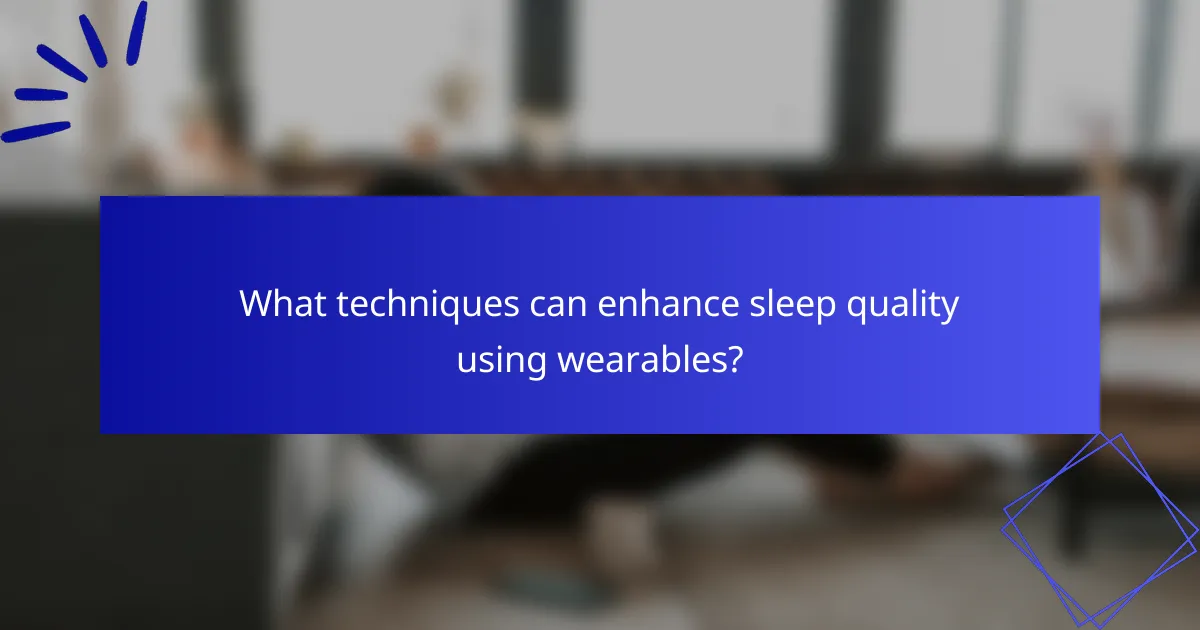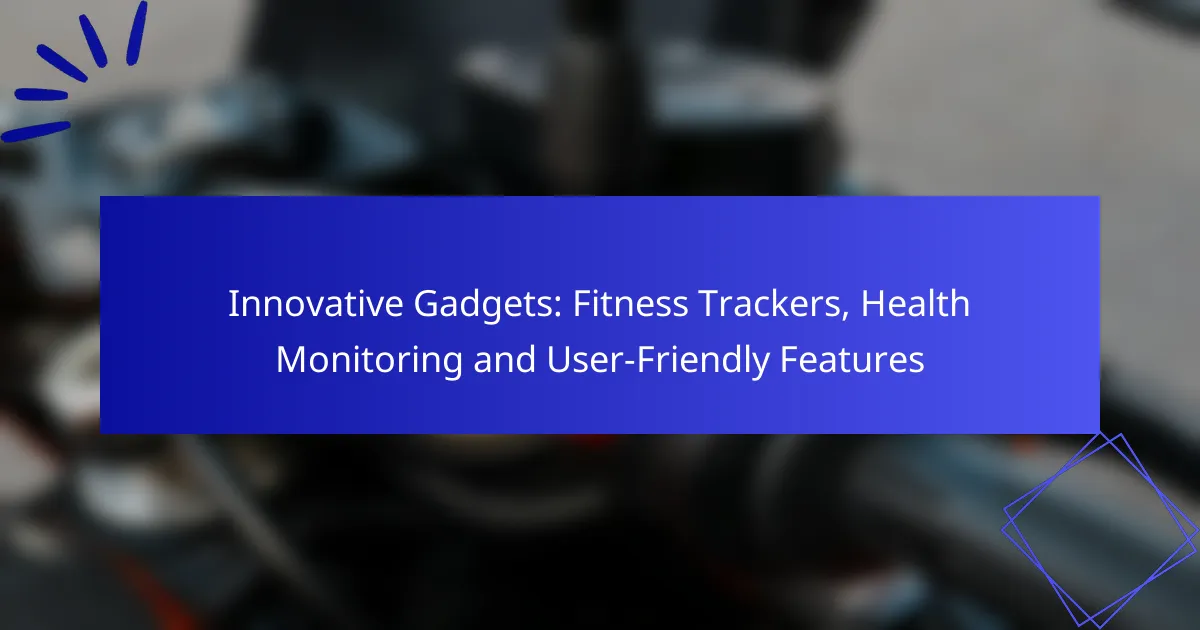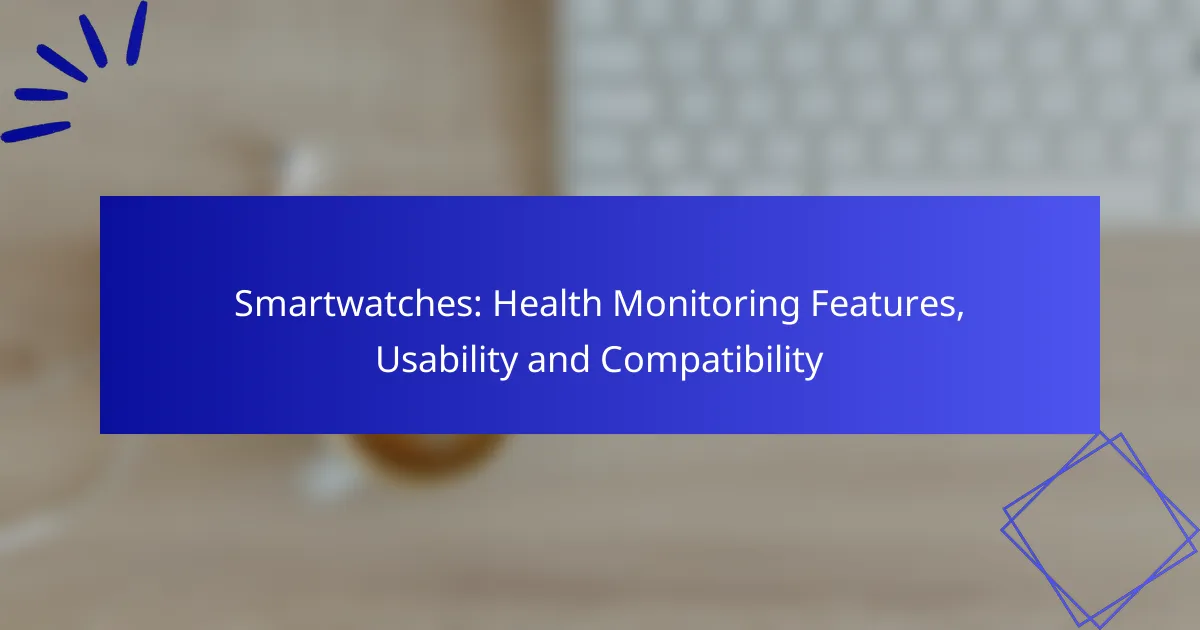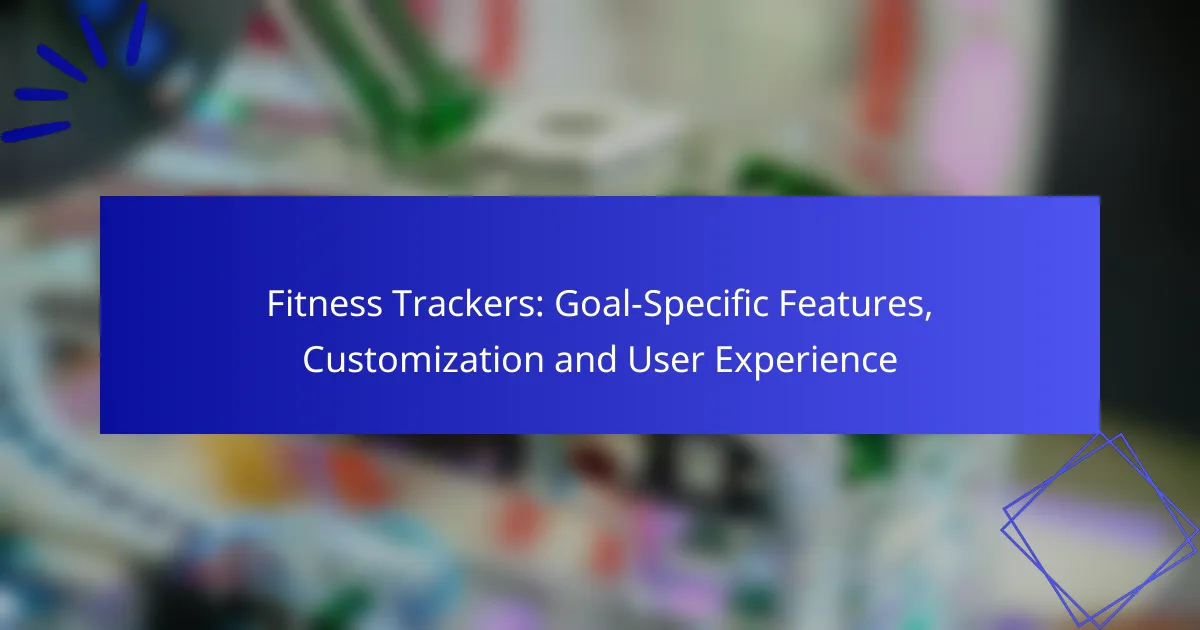Wearable devices have revolutionized sleep tracking by offering continuous monitoring of physiological metrics, enabling users to understand their sleep patterns and quality better. By utilizing advanced sensors and algorithms, these devices provide valuable insights that can help identify sleep issues and suggest personalized improvement techniques for enhanced rest and overall well-being.
![]()
How do wearable devices improve sleep tracking?
Wearable devices enhance sleep tracking by providing continuous monitoring of various physiological metrics, allowing users to gain insights into their sleep patterns and quality. These devices utilize advanced sensors to collect data, which can help identify sleep issues and suggest improvements.
Continuous heart rate monitoring
Continuous heart rate monitoring is a key feature of many wearable devices, providing real-time data on your heart rate throughout the night. This information helps identify patterns that correlate with sleep quality, such as elevated heart rates during restless sleep.
By tracking heart rate variability, users can gain insights into their stress levels and overall health, which can impact sleep. For optimal results, aim for a heart rate that remains steady during sleep, indicating restful periods.
Sleep stage analysis
Sleep stage analysis allows wearables to differentiate between light, deep, and REM sleep, offering a comprehensive view of your sleep cycle. Understanding these stages is crucial, as each plays a unique role in physical recovery and cognitive function.
Many devices use accelerometers and heart rate data to estimate these stages, providing users with insights into how long they spend in each phase. Aim for a balance of sleep stages to ensure restorative rest, typically involving several cycles of deep and REM sleep each night.
Sleep environment assessment
Wearable devices can assess sleep environments by monitoring factors such as temperature, humidity, and noise levels. These environmental factors significantly influence sleep quality, making it essential to create a conducive sleeping atmosphere.
For example, a cooler room temperature (around 18-22°C) is often recommended for better sleep. Users can adjust their environments based on data collected by their devices to enhance their overall sleep experience.
Data integration with health apps
Many wearable devices offer data integration with health apps, allowing users to track their sleep alongside other health metrics like physical activity and nutrition. This holistic approach helps users understand how lifestyle choices affect their sleep quality.
For effective tracking, choose apps that provide comprehensive insights and actionable recommendations based on your sleep data. Regularly reviewing this information can help identify patterns and make informed adjustments to improve sleep hygiene.
Real-time feedback
Real-time feedback from wearable devices can help users make immediate adjustments to their sleep habits. Notifications about sleep quality or reminders to maintain a consistent sleep schedule can enhance overall restfulness.
Utilizing features like bedtime reminders or relaxation techniques suggested by the device can lead to improved sleep outcomes. Regularly engage with these features to develop healthier sleep routines and maximize the benefits of your wearable device.
![]()
What are the best wearable devices for sleep tracking?
The best wearable devices for sleep tracking combine advanced sensors and algorithms to monitor sleep patterns, providing insights into sleep quality and duration. Popular options include fitness trackers and smartwatches that offer features tailored to improving sleep hygiene.
Fitbit Charge 5
The Fitbit Charge 5 is a versatile fitness tracker that offers comprehensive sleep tracking features. It uses a combination of heart rate variability, SpO2 levels, and movement data to analyze sleep stages, giving users a detailed overview of their nightly rest.
With its Sleep Score feature, users can easily assess their sleep quality on a scale from 1 to 100. The Charge 5 also provides personalized insights and recommendations to enhance sleep habits, making it a practical choice for those looking to improve their sleep health.
Apple Watch Series 8
The Apple Watch Series 8 includes robust sleep tracking capabilities integrated with the watchOS. It monitors sleep duration and quality, utilizing heart rate and motion sensors to provide insights into sleep patterns.
Users can set sleep schedules and receive reminders to wind down, promoting better sleep hygiene. The watch also offers a Sleep Focus mode, which minimizes distractions during the night, enhancing overall sleep quality.
Oura Ring Generation 3
The Oura Ring Generation 3 is a unique sleep tracker designed as a ring, making it discreet and comfortable to wear overnight. It tracks various metrics, including heart rate, body temperature, and movement, to provide a comprehensive analysis of sleep quality.
Its app offers personalized insights and daily readiness scores, helping users understand how their sleep impacts their overall health. The Oura Ring is particularly favored for its long battery life and minimalistic design.
Garmin Venu 2
The Garmin Venu 2 is a smartwatch that excels in fitness tracking, including sleep monitoring. It provides detailed insights into sleep stages and overall sleep quality, leveraging advanced sensors to gather accurate data.
With features like Body Battery, which tracks energy levels throughout the day, users can correlate their daily activities with sleep quality. The Venu 2 also allows for customizable sleep goals to help improve sleep habits over time.
Whoop Strap 3.0
The Whoop Strap 3.0 focuses on recovery and performance, offering in-depth sleep tracking as part of its subscription service. It continuously monitors heart rate and other physiological metrics to provide insights into sleep quality and recovery status.
Users receive personalized recommendations based on their sleep data, helping them optimize their training and recovery routines. The Whoop Strap is particularly popular among athletes looking to enhance performance through better sleep management.

What techniques can enhance sleep quality using wearables?
Wearable devices can significantly improve sleep quality through various techniques that leverage data tracking and personalized insights. By focusing on sleep hygiene, personalized coaching, relaxation methods, and maintaining a consistent sleep schedule, users can optimize their rest and overall well-being.
Sleep hygiene practices
Sleep hygiene refers to habits and environmental factors that promote better sleep. Key practices include maintaining a comfortable sleep environment, such as a cool, dark, and quiet room, and avoiding screens at least an hour before bedtime. Regularly cleaning bedding and ensuring a comfortable mattress can also enhance sleep quality.
Additionally, limiting caffeine and heavy meals in the evening can prevent disruptions during the night. Establishing a calming pre-sleep routine, like reading or gentle stretching, can signal to your body that it’s time to wind down.
Personalized sleep coaching
Wearables often provide personalized sleep coaching based on individual sleep patterns and behaviors. These devices analyze data to offer tailored recommendations, such as optimal bedtimes and wake times, which can help users align their sleep with their natural circadian rhythms.
Some wearables even include features that allow users to set goals and track their progress over time. This feedback loop can motivate individuals to make necessary adjustments to their sleep habits, leading to improved quality of rest.
Relaxation techniques
Incorporating relaxation techniques can significantly enhance sleep quality. Many wearables offer guided breathing exercises or meditation sessions that help reduce stress and prepare the mind for sleep. Engaging in these practices before bed can lower heart rates and promote a sense of calm.
Users may also benefit from progressive muscle relaxation or gentle yoga stretches, which can alleviate physical tension. Finding the right technique that resonates personally can make a substantial difference in achieving restful sleep.
Sleep schedule consistency
Maintaining a consistent sleep schedule is crucial for regulating the body’s internal clock. Aim to go to bed and wake up at the same times every day, even on weekends, to reinforce this rhythm. This consistency helps improve overall sleep quality and can reduce the time it takes to fall asleep.
Wearables can assist in tracking sleep patterns and reminding users when it’s time to wind down. Setting alarms for both bedtime and wake time can help establish this routine, making it easier to adhere to a consistent sleep schedule.
![]()
What are the user benefits of sleep tracking devices?
Sleep tracking devices offer numerous benefits, including insights into sleep patterns, improved sleep quality, and enhanced overall well-being. By monitoring sleep metrics, users can make informed decisions to enhance their rest and health.
Improved sleep quality
Sleep tracking devices help users identify patterns and disturbances in their sleep, leading to better sleep quality. By analyzing data such as sleep duration and cycles, individuals can adjust their bedtime routines and environments to promote deeper sleep.
For example, if a user notices frequent awakenings during the night, they might consider reducing caffeine intake in the afternoon or creating a more relaxing bedtime environment. Small changes can lead to significant improvements in sleep quality.
Better health insights
These devices provide valuable health insights by tracking metrics like heart rate and breathing patterns during sleep. Users can gain a clearer understanding of how their sleep affects their overall health, potentially identifying issues such as sleep apnea or irregular heart rhythms.
Regular monitoring can help users recognize trends, such as how stress or diet impacts their sleep. This awareness can prompt them to seek medical advice if necessary, leading to timely interventions and better health outcomes.
Enhanced productivity
Improved sleep quality directly correlates with increased productivity during waking hours. Users who track their sleep often report feeling more alert and focused, which can enhance performance at work or in daily tasks.
For instance, a well-rested individual may complete tasks more efficiently and with greater creativity. By prioritizing sleep, users can maximize their productivity and overall effectiveness in their personal and professional lives.
Informed lifestyle changes
Sleep tracking encourages users to make informed lifestyle changes that promote better sleep. By understanding their sleep patterns, individuals can adjust their daily habits, such as exercise routines and meal timings, to support healthier sleep cycles.
For example, someone may find that exercising earlier in the day leads to better sleep at night. Tracking these changes can help users refine their routines, leading to sustained improvements in sleep and overall health.
![]()
What criteria should be considered when choosing a sleep tracking device?
When selecting a sleep tracking device, consider factors such as accuracy, battery life, comfort, and compatibility with other health apps. These criteria can significantly influence the effectiveness of the device in providing meaningful insights into your sleep patterns.
Accuracy of tracking features
The accuracy of tracking features is crucial for obtaining reliable sleep data. Look for devices that utilize multiple sensors, such as accelerometers and heart rate monitors, to provide a comprehensive view of your sleep stages. Devices that are clinically validated or have positive user reviews regarding their accuracy are often more trustworthy.
Common metrics to assess include total sleep time, sleep efficiency, and the ability to distinguish between light, deep, and REM sleep. Some devices may also offer insights into sleep disturbances, which can help identify patterns or issues affecting your rest.
To ensure accuracy, consider how the device fits into your lifestyle. For example, a wrist-worn tracker may be less accurate if you frequently change positions during sleep. Choose a device that aligns with your sleeping habits for the best results.









